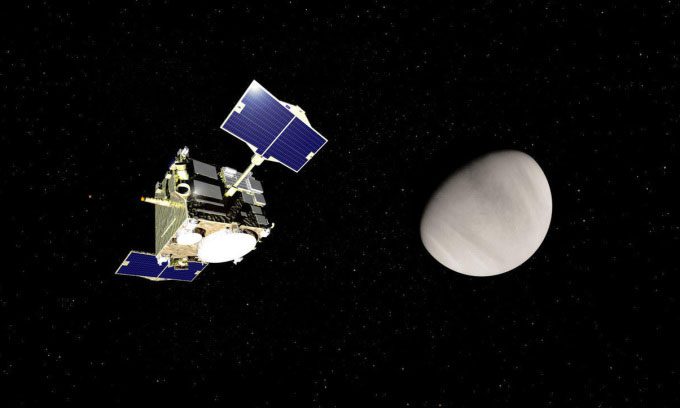The Akatsuki spacecraft from Japan, currently the only operational spacecraft in orbit around Venus, lost contact last month.
The Institute of Space and Astronautical Science (ISAS) of Japan lost communication with the Akatsuki spacecraft following an operation at the end of April due to an extended low-altitude stability control mode, Space reported on May 30. Experts are working to reestablish contact with the spacecraft.

Akatsuki, the only spacecraft currently operational in orbit around Venus. (Image: NASA)
The spacecraft needs to maintain stable orientation to keep its antenna directed towards Earth for communication. “We will announce future plans once we have more clarity. Thank you for your warm support,” the Akatsuki team wrote on social media platform X.
Akatsuki, meaning “dawn” in Japanese, has the primary mission of studying the climate of Venus. It is currently the world’s only spacecraft operational in orbit around the second planet from the Sun. The spacecraft, which cost $300 million, was launched into space in 2010. The mission had a rocky start as the spacecraft could not achieve orbit around Venus due to issues with its main engine.
However, the Akatsuki team found a second opportunity. In 2015, after five years circling the Sun, Akatsuki successfully entered orbit around Venus. The spacecraft has conducted various scientific tasks since then, including some surprising observations.
Akatsuki has completed its primary mission. The spacecraft began an extended operational phase in 2018. Even if it cannot be “rescued” this time, the spacecraft has demonstrated the problem-solving capabilities of engineers at the Japan Aerospace Exploration Agency (JAXA) and enhanced humanity’s understanding of the climate and atmospheric dynamics of Venus.
Even if Akatsuki ceases operations, Venus will not be without “companions” for long. Scientists are particularly interested in why Venus experiences intense greenhouse effects, becoming the hottest planet in the Solar System, and potential biosignatures in its atmosphere. New spacecraft from NASA, the European Space Agency (ESA), India, and a private company may be heading to Venus by the end of this decade.




















































